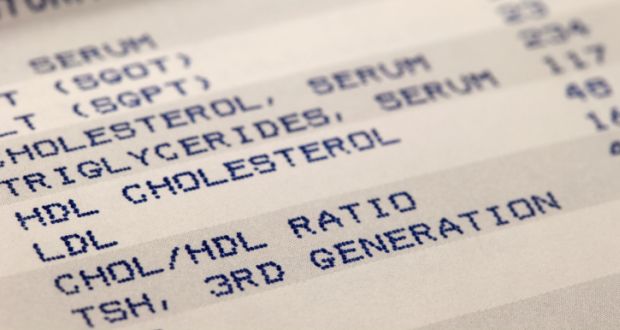
After surgery for prostate cancer, elevated levels of total cholesterol and triglycerides – two types of fat found in the blood – may increase the risk for disease recurrence, according to a new study published in Cancer Epidemiology, Biomarkers & Prevention, a journal of the American Association for Cancer Research.
Prostate cancer is the most common non-skin cancer in American men. This year, 233,000 men will be diagnosed with prostate cancer, and 29,480 will die from it. For men with localized disease, radical prostatectomy — or surgery to remove the prostate gland and surrounding tissue– is a common treatment option. However, approximately 30 percent of men have a recurrence of their prostate cancer within 10 years of surgery.
Numerous studies have suggested a relationship between cardiovascular disease risk factors — including obesity, high blood pressure, and elevated blood sugar and lipid levels — and the development and recurrence of prostate cancer. Further supporting this link, recent epigenetic analyses indicate that these risk factors may share a great deal of genetic overlap with prostate cancer.
However, while laboratory studies have linked high cholesterol levels to a heightened risk of aggressive prostate cancer, the results of population-based studies have been less clear. It is also unknown whether various types of lipids – specifically, high density lipoproteins (HDL’s, or “good” cholesterol), low density lipoproteins (LDL’s, or “bad” cholesterol), and triglyercides – have differential effects on cancer risk.
In the new investigation, researchers from Duke University School of Medicine in Durham, NC, set out to explore this link further by analyzing lipid levels as a potential indicator of the risk of disease recurrence
“Given that 45% of deaths worldwide can be attributed to cardiovascular disease and cancer, with prostate cancer being the second most common cause of male cancer deaths in the US, understanding the role of dyslipidemia as a shared, modifiable risk factor for both of these common causes of mortality is of great importance,” says Dr. Emma Allot, PhD, postdoctoral associate at Duke and lead author of the paper.
Normalization of blood lipid levels may reduce prostate cancer recurrence
Dr. Allot’s team measured the blood lipid levels of 843 men with prostate cancer who had undergone a radical prostatectomy. None of the men had ever taken statins (cholesterol-lowering drugs) prior to the analysis. Upon analysis, a total of 588 of the men had abnormal blood lipid profiles (325 had abnormal cholesterol levels and 263 had abnormal triglyceride levels). Biochemical recurrence – increased prostate-specific antigen (PSA) levels that indicate prostate cancer recurrence – occurred in 293 of the men.
Results of the analysis revealed that men whose triglyceride levels were 150 mg/dL or higher (normal levels are defined as 150 mg/dL or lower) were a staggering 35% more likely to experience prostate cancer recurrence that men whose triglyceride levels were normal. Among men with total cholesterol levels 200 mg/dL or higher, every 10mg/dL increase was linked to a 9% higher risk of prostate cancer recurrence.
Scientists have proposed two major mechanisms for explaining the link between lipid levels and prostate cancer. The first explanation is that prostate cancer cells over-accumulate cholesterol in their cell membranes, forming lipid rafts, which facilitates pro-carcinogenic cell signaling. Secondly, it has also been explained that high cholesterol is vital for carcinogenesis because it activates several biological processes, including Akt signaling, that promote cancer growth; conversely, lower cholesterol levels are thought to inhibit pro-carcinogenic activities within prostate cells. Similarly, high triglycerides have been associated with elevated levels of reactive oxygen species and oxidative stress, in addition to development of insulin resistance, all of which have been associated with prostate tumor growth.
In contrast to men with high lipid levels, for men with abnormally low levels of “good” (HDL) cholesterol (defined as below 40 mg/dL), every 10 mg/dL increase was associated with a 39% reduced risk of prostate cancer recurrence, indicating that HDL’s may indeed offer some sort of protective benefits. While the mechanism(s) by which HDL’s affect cancer growth is not yet entirely understood, the researchers note that HDL’s have been found to exhibit anti-inflammatory, antiproliferative, and antioxidant properties, which may slow prostate cancer growth and progression.
“Understanding associations between obesity, cholesterol, and prostate cancer is important given that cholesterol levels are readily modifiable with diet and/or statin use, and could therefore have important, practical implications for prostate cancer prevention and treatment,” says Dr. Allot.
“Our findings suggest that normalization, or even partial normalization, of serum lipid levels among men with dyslipidemia [abnormal lipid profile] may reduce the risk of prostate cancer recurrence,” she adds. These results, coupled with past evidence demonstrating that statin use is associated with reduced recurrence risk, suggest that lipid levels should be explored further as a modifiable risk factor for prostate cancer recurrence, the authors conclude.
